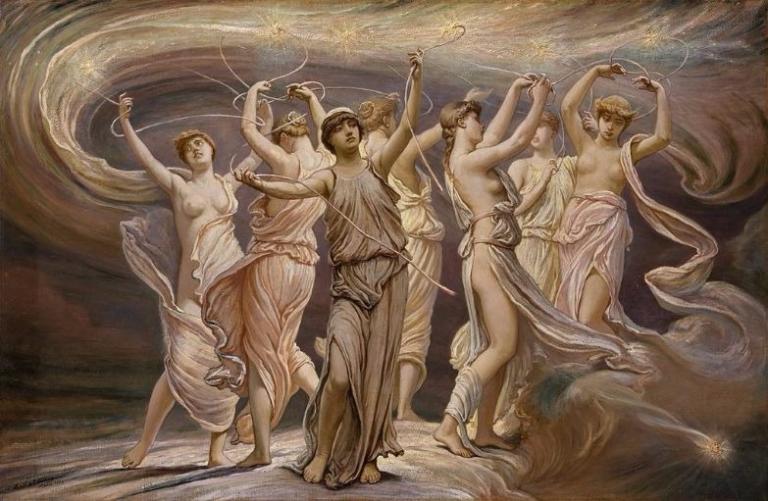What captivates my mind at the moment is contemplating the future of religion. Where will religion be by the end of this century? What will religion be like in the next century? How will monotheism change? What does the future look like for paganism? How will paganism evolve? Will paganism grow? I think it will grow, as paganism is a religion for our future.
When it comes to religion it appears true that everything old is new and vice versa. When Christianity came onto the scene, it was a new religion. The traditional religions of the Greco-Roman world had been around for centuries and well entrenched into the cultures of empire. Christianity was new, it was “oriental” and with that brought some people to it out of curiosity. Some willingly converted, but by in large Christianity was overwhelming forced onto the empire, out of fear, or political expediency people converted. Much like the new age wave of the late 20th century, Christianity was different and provided something new for people who were possibly experiencing religious fatigue.

Religious fatigue is causing the religious landscape to change once more. Christianity is old. It is not the new religion it once was to attract the curious; it is also losing power to secular governments, thankfully. Another important observation, they are not producing enough new Christians via births to retain their dominance. Globally, monotheism is not dying out, Islam is positioned to become the largest religion by the second half this century.[1]Americans are also becoming more spiritual but less religious; Pew Research reports that over a quarter of adults identify as spiritual but not religious, up 8% from five years ago.[2] Atheism is also seeing growth, especially with millennials.[3]
What about paganism? Our Hindu friends are and will continue to face challenges from the onslaught of monotheism. For Christianity to secure its dominance (population wise), they will have to convert in large numbers. The number one target of Christian conversation is India, the last largest polytheistic population with an estimated one billion adherents. Project Thessalonica, a Christian missionary effort, is working to evangelize India. A sub-project of the Joshua Project II, they report that in India the “evangelical annual growth” is at 3.9%[4] It was reported earlier this summer that ten people were arrested for allegedly trying to convert tribal children of Jhabau and Alirapur region to Christianity.[5] There are also the reports of temple vandalism from Muslims.[6]
Every pagan should be mindful of the missionary activates around the world. Their goal is the eradication of indigenous (pagan) traditions, all done in the name of their god in the attempt to “save souls.” If such missionary organizations are to be truly successful, Hindus will become a minority in their homeland. They will then disappear like the Hellenes, Romans, Heathens and countless others.
While paganism faces challenges around the world, there is hope for continued growth and advancement. What is old is new again, paganism is new again. It is fresh and different while at the same time familiar. Paganism might seem obsolete to those outside of our big tent, it is relevant.
Because of the religious fatigue experienced by many, often caused by dissatisfaction with organized religion, paganism is providing fulfillment for people who were lacking spiritual satisfaction. Paganism is satisfying people; it is rewarding. For religion to be successful, it needs to be functional and meaningful. The religion has to mean something and do something for the adherent. People tend to leave Christianity, or whatever religion they followed because it lost these two essential qualities. Their birth religion did not provide meaning, fulfillment and left them wanting.
Paganism is a religion for our future because it provides fulfillment on the individual level and is productive on a societal level. Monotheism, while it can be fulfilling on the individual level, on a societal level, it proves to be a detriment. Religious extremism is one clear societal determent that is systemic within monotheism. Paganism, in my opinion, can eliminate this.

On the individual level, paganism offers personal religion that many people crave. One of the reasons Christianity is popular with people is the relationship with Jesus that many claims to have. Christians do not have exclusive claims to divine relationships, pagans also claim to have relationships with their god(s). The personal nature of paganism removes the need for an intermediary like a priest. People coming to paganism generally express dissatisfaction with organized religion, paganism provides direct access to divinity people want.
On the societal level, paganism is the best path that protects and advances multi-culturalism. The beauty of paganism’ polytheistic nature, is the diverse pantheons of various cultures. Every culture’s religion is seen as special and equally truthful. Within monotheism, however, this is not the case. Monotheism does not see other religions as equal in truth or worthy of protection. Historically, Christians persecuted pagans because the pagan religions were seen as evil. According to the early Christians, the gods were actually demons, the fallen angels from heaven. How can a religious system that views outside religions as demonic be an advocate for religious diversity and religious equality?
Monotheism also creates mono-culturalism, it does not defend diversity because diversity means different opinions and views from the “correct” views, which leads to conflict. Having different denominations of the same religion is not real diversity. Different cultural appearances of one religion do not create real diversity. True diversity is found in diverse cultures, expressing unique traditions, philosophies, pantheons, and literature. True diversity, a real multi-cultural society views these difference worthy of respect and preservation.

If we want to end religious extremism, then paganism is the way forward. Religious extremism is fueled by monotheism’s claim of Absolute Truth in knowing God, his will, and what is proper for mankind. No deviation is allowed away from what is viewed as orthodox. This breeds violence and intolerance towards anyone or anything different.
If the world accepted a pagan mindset, in which religion is relegated to a culture’s tradition instead of the universal, we could end the fight of religious absolutism. In other words, religious relativism places Yahweh on the same level as any other god. Yahweh is not the supreme creator of the world, he is not anything special. Instead, he would just be seen as another god among many other gods. His “will” would be limited in reach, not a universal law.
Making Yahweh relative again, scaling him down from the lofting highest as the only one god would free humanity from their blind allegiance to him. A god which most of the world owes nothing to and does not really need. Unbinding the world from Yahweh can end religious extremism and restore harmony in the world.
NOTES
[1] “Why Muslims Are the World’s Fastest-growing Religious Group,” Pew Research Center, last modified April 6, 2017, http://www.pewresearch.org/fact-tank/2017/04/06/why-muslims-are-the-worlds-fastest-growing-religious-group/.
[2] “More Americans Now Say They’re Spiritual but Not Religious,” Pew Research Center, last modified September 6, 2017, http://www.pewresearch.org/fact-tank/2017/09/06/more-americans-now-say-theyre-spiritual-but-not-religious/.
[3] “Religious Landscape Study,” Pew Research Center’s Religion & Public Life Project, last modified May 11, 2015, http://www.pewforum.org/religious-landscape-study/religious-family/atheist/.
[4] Joshua Project, “India | Joshua Project,” Joshua Project, accessed October 29, 2017, https://joshuaproject.net/countries/IN.
[5] 71 Tribal Children Rescued in MP En Route to ‘Bible Camp’; Missionaries Claim Persecution -,” Hindu Post – Truth Alone Triumphs, Not Untruth, last modified June 11, 2017, http://www.hindupost.in/politics/71-tribal-children-rescued-mp-en-route-bible-camp-missionaries-claim-persecution/.
[6] Mauritius: 9 Goddess Kali Temples Attacked,” CT, last modified November 2, 2017, http://www.currentriggers.com/world/mauritius-goddess-kali-temples-attacked/.













